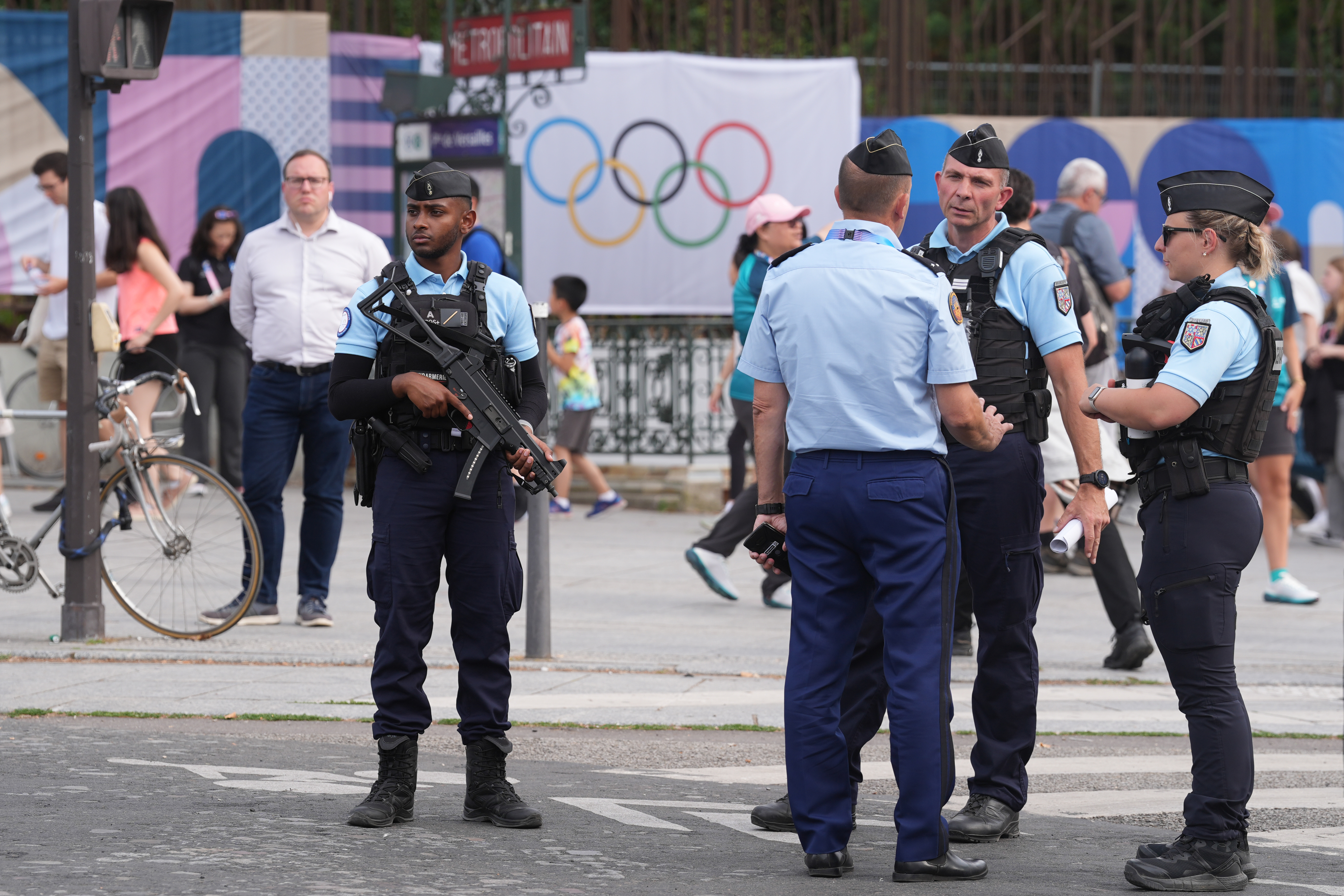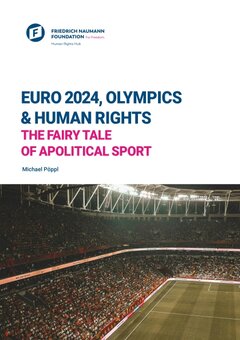Olympic Games
How Political Are the Paris Olympics?

Before the Summer Olympics in Paris: Police officers stand guard in a street in Paris.
© picture alliance/dpa | Marcus BrandtThe Olympic Games have often been a stage for political expression and controversy. From the boycotts of the Moscow and Los Angeles Games during the Cold War to the protests against awarding the Games to countries with contentious domestic and international policies, like Russia (2014) and China (2022). The Paris Summer Olympics, starting in just a few hours, are another example that the intersection of politics and sport is an inextricable part of Olympic history. This, however, is not the image that the International Olympic Committee (IOC), the governing body of the National Olympic Committees and of the worldwide Olympic Movement, wishes to convey. In spite of current geopolitical tensions, conflicts, human rights issues, and environmental and social justice movements that continually challenge the ideal of political neutrality, the IOC is still trying to make “apolitical Games” happen. The Olympic Games in Paris, by addressing the global sustainability imperative, acknowledging the changing threat of international terrorism, practicing public diplomacy and maneuvering the shaky political terrain of the host country, clearly show that it is not going to happen.
The most sustainable Games ever
It was a jump in at the deep end. As Paris Mayor Anne Hidalgo, after months of anticipation, took a dip in the Seine River nine days ago, she was fulfilling a century old political promise: to make the Seine clean (enough) again. Swimming in the Seine has been banned since 1923. When Jacques Chirac, the former French president, was Paris mayor, he made a similar pledge but failed to deliver on it. Since 2015, organizers have invested at least €1.4 billion to depollute the Seine for the Olympics and prevent it from flooding, as well as to ensure that Parisians can enjoy a cleaner river in the years after the Games. The investment included the construction of a giant underground rainwater storage basin called “Bassin d'Austerlitz” in central Paris, the overhaul of sewer infrastructure across the region and public anti-pollution campaigns (understandable considering the anti-Olympics campaigns like #JeChieDanslaSeine, i.e. “IShitInTheSeine”). Whether the river will still be swimmable when the marathon swimming and the swimming leg of the triathlon are scheduled to take place, depends very much on the weather. A rainfall on the competition day can cause the wastewater to overflow and the levels of fecal indicator bacteria like Escherichia coli and enterococci in the river to spike up, potentially exposing athletes to serious health risks. In late June, after a heavy rain, the water tests near the bridge Pont Alexandre III have shown unsafe elevated levels of E.coli, far from the “good” water standard.
Despite the unpredictability of the weather, the organizers are eager to make the Games “greener” by cutting the Games-related carbon footprint by half compared to previous editions. New and renovated venues are being designed to minimize carbon footprints (95% of venues are pre-existing or temporary), employing green building standards and renewable energy sources. Cutting single-use plastic, food waste and increasing the plant-based options in catering while relying on local agriculture production also contribute to that goal. In addition, the Olympic Village will be transformed into a new residential and business district after the Games. Transport infrastructure is also receiving a green upgrade, with the expansion of the public transit network to reduce reliance on cars and cut down on emissions. Electric buses, enhanced metro lines, and extensive bike lanes are being rolled out to ensure efficient and eco-friendly mobility for athletes, visitors, and residents alike. However, not all residents are enthusiastic about the changes in the city.
The unprecedented security operation
Some Parisians are pretty (to put it mildly) upset about how the preparations for the Games are affecting their everyday lives. French businesses were hoping for an economic boom during the Olympics but because of the tough security measures, they are now cordoned off from the potential customers. Metal barriers, checkpoints and walls can be seen on every corner, with major metro stations closed and entire lanes of traffic blocked off exclusively for the Olympics. The access to Paris’ iconic city center, that includes the Louvre, Notre Dame and the Eiffel Tower, has been restricted and it can only be accessed by showing a special QR code granted to residents and people who work in the area close to the river. That’s because, for the first time in the history of the Olympic and Paralympic Games, the Opening Ceremony will happen not in a stadium but on the river. The opening parade will follow the course of the Seine, from east to west over 6 kilometers, and securing it will be the largest peacetime deployment of security forces in French history, with 45,000 police officers and gendarmes on duty for today’s Opening Ceremony and 35,000 working every day during the Games. The tough security measures for the Paris Olympics, boosted with foreign military and police support, are understandable given the city's history with terrorism and the Olympics' unfortunate attraction as a big stage for terrorists. Paris has faced numerous terrorist attacks, notably the coordinated shootings and bomb blasts in November 2015, making vigilance paramount. Historically, the Olympics have been targeted also, with the Munich massacre in 1972 as a stark reminder.
The myth of neutrality
While the International Olympic Committee asserts that the Games transcend politics, history would beg to differ. From the 1936 Berlin Olympics, used by Nazi Germany as a propaganda tool, to the boycotts of the 1980 and 1984 Games by the USA and the Soviet Union respectively, political motives have often overshadowed athletic achievements. The very selection of host cities can be politically charged, as evidenced by the controversial choice of Beijing for the 2008 and 2022 Games despite concerns over human rights violations. Additionally, athletes have used the global stage to make political statements, such as the iconic Black Power salute by Tommie Smith and John Carlos in 1968. More recently, issues like Russia’s state-sponsored doping scandal and debates over the rules and regulations for transgender athletes highlight ongoing political and ethical disputes.
Following the Russian invasion of Ukraine in February 2022, athletes from Russia and Belarus were banned from world sports, but the IOC orchestrated their gradual return as Individual Neutral Athletes (AINs), subject to strict conditions. 36 Russians and 22 Belarusians were invited to take part in Paris, compared with 330 Russians and 104 Belarusians at the Tokyo Olympics in 2020, but around the half of them declined the invitation. The IOC has also barred the two countries from any team events, their athletes will not be allowed to wear national colours or emblems, they will not be able to participate on the Seine during the opening ceremony, and will not appear in the medals table.
The ongoing war in Gaza also casts shadow over the Games. The Palestinian Olympic Committee is calling for Israeli athletes to be banned from the event due to the bombings of the besieged Gaza Strip, a call also made by radical left French MPs. President Emmanuel Macron dismissed the calls to sanction the Israeli delegation and said that they are welcome in Paris and must compete under their colours. IOC president Thomas Bach also said that he would not be drawn into "political business".
The Olympic Games are a good opportunity to shine a light on the state of human rights in the world. Calls for banning Afghanistan from the Paris 2024 Olympics stem from the Taliban's oppressive regime, particularly its harsh restrictions on women and girls in sports and education. The IOC made clear that no Taliban official will be allowed at the Games, while Afghanistan will have a gender–balanced team at the Paris Olympics with three women and three men participating. The agreement was made with the Afghanistan's national Olympic committee (NOC), currently in exile and recognised by the IOC. Despite the IOC’s efforts to maintain an apolitical stance, the Games are inevitably intertwined with global politics, reflecting broader societal conflicts and power dynamics. Thus, the ideal of a politically neutral Olympics remains more of an aspiration than a reality, as the intersection of sports and politics continues to be inescapable.
The looming cloud of political instability
France's political crisis casts a long shadow over the world's largest sporting event. After the second round of the snap parliamentary elections, it is clear that France is facing a difficult time forming a new government.
Following its election victory, the left-wing alliance Nouveau Front populaire (NFP) has agreed on Lucie Castets as its joint candidate for the office of prime minister. The 37-year-old is a senior finance official at Paris City Hall and economist. Castets is independent. The four parties - the hard-left party “France Unbowed”, the Socialists, the Greens and the Communists – praised Castets’ fight against tax fraud and financial crime and her experience in working with non-governmental organisations.
The immediate announcement made by Castets that one of her top priorities would be to "repeal the pension reform" pushed through by Macron's government and to implement a "major tax reform so everyone pays their fair share" is certainly not music to President Macron’s ears.
Macron declared that he would not make a decision on the appointment of the prime minister until after the Paris Olympics. ‘It is our responsibility to ensure that the Games go well,’ Macron said on France 2. During the Olympics, Macron’s centre-right government will remain in office on a caretaker basis in order to avoid “disorder”.
The political unrest threatens to overshadow the celebration of athletic excellence, as the government juggles maintaining order with showcasing France on the global stage. The stakes are high, with the Olympics serving as a critical test of France's resilience and leadership under Macron's embattled administration and he seems determined not to allow anyone to rain on his parade.

